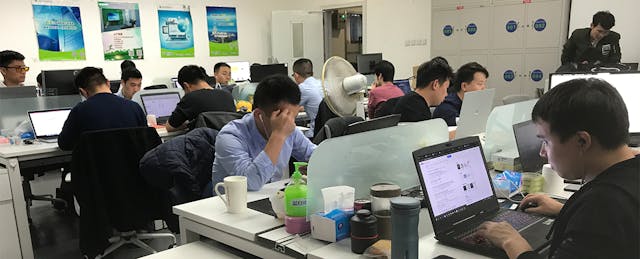Beijing—The Chinese government is pushing online education these days, and like so many things in this country of 1.4 billion people, that means going big. One sign of that: There’s a 22-story tower in the country’s capital officially named the “MOOC Times Building” that houses a government-supported incubator for edtech companies.
The building boasts two tricked-out production studios that any of the companies in the industry park can use to film and edit video for courses. Most of the occupants offer products or services in online learning, though not necessarily massive open online courses or MOOCs, despite being the building's namesake. But MOOCs were trending upward back in 2014 when the education incubator was established, so it made a catchy name for the building.
The building sits in the Zhongguancun area of Beijing, which is known as China’s “Silicon Valley.” The biggest benefit to companies in the building is cheap rent in a prime location—about half of what they would otherwise pay for the space.
About half of the companies that have applied to work in the building were accepted, the building’s general manager, Yang Dan, explained when I recently toured the facility. When asked how closely leaders of the facility work with the Chinese government, Dan said: “we just follow the policy,” noting that the government “leads how to develop education” and that their goal is to help promote those policy goals.
As part of the tour, I was shown a short promotional video that said of the more than 70 companies in the building, roughly 9 percent focus on preschool, 25 percent focus on K-12, 17 percent on higher education and 28 percent on vocational education.
The size of the companies also varies widely. Some are start-ups with fewer than 10 people each—many of these work in a co-working space on the ninth floor.
Meanwhile, other companies with offices here are already well established and have much larger staffs. The tour included a stop of one such company, called Nobook, which employs 55 people and makes interactive science-learning software for schools in China.
As the education market in China grows, the facility has recently started encouraging some of the larger companies to leave the nest and make room for smaller ventures that are just getting started, said Bill Ning, founding partner of Blue Elephant Capital, a venture-capital firm that is also located in the building and invests in some of the companies there.
But some of those open spots might go to companies outside of the country. The biggest new initiative of the MOOC Times Building is an attempt to attract international companies to set up offices here.
“We hope some international startups will come to our building to know the Chinese culture,” said Dan. “We hope we can cooperate with companies in the U.S., U.K., and elsewhere.”
Justin Reich, director of the Teaching Systems Lab at MIT, visited the building a couple of years ago, and was struck by how government leaders he spoke with stressed that they wanted to let market forces shape online learning. The government seemed to take a more hands-off approach to online learning than in other parts of the education sector there. For instance, he knows someone trying to start a physical school in China, and that process involves navigating several levels of local and district party leaders. Things move more quickly, and with less red tape, for education entrepreneurs starting online companies, it seems.
In a blog post he wrote about his visit, Reich noted that online education may be especially helpful in addressing China’s rural education needs, since the demand for education far exceeds the supply of teachers in many places.
As he wrote: “China has several long traditions that ameliorate concerns about online learning quality. First, China has a long history of distance education with television and video, so MOOCs feel like an extension of that work rather than a new phenomenon. Second, Chinese instruction is generally didactic, so the gap between listening in a lecture hall and listening online is modest. Third, there is some sense of a Confucian tradition where teachers are revered orators and students are responsible for the hard work of memorizing and synthesizing from these teachers. As a result, once you can distribute the teacher's presentations and give everyone an equal chance to hear and process them, you've achieved equity.”


